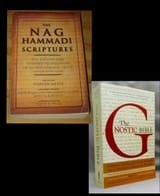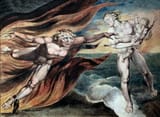Gnostic anon
8/12/2025, 2:36:36 AM No.24630916
Most banned books in history that I know of:
>Gnostic texts (Nag Hammadi and later works)
Barnstone's Gnostic Bible and "The Nag Hammadi Scriptures: The Revised and Updated Translation of Sacred Gnostic Texts Complete in One Volume " both contain all of these works. The former contains Nag Hammadi and later works (like the Cathars whose heresy was squashed in the Albigensian Crusade where many were persecuted and murdered by the Catholics for spreading the truth) but isn't complete in the Nag Hammadi, but it is friendlier to the reader while the latter is only Nag Hammadi, is more scholarly and is complete in every known Nag Hammadi work that's been uncovered since 1945. The Gnostic religious texts are the most banned books historically and the only reason we still have them is nothing short of divine intervention.
Funny enough, the canonical Bible still has some Gnostic "Freudian slips" to it (like 2 Corinthians 4:4). While no "Gnostic" reinterpretations of canonical scripture exist as far as I'm aware, but the Codex Sinaiticus and Codex Vaticanus were used by early Christians and some Gnostics, although no solid full English translation of those two that I know of that exist as a standalone in one work.
>the Library of Alexandria
Not so much a "banned book" (or collection of books, rather), however when Julius Caesar besieged Alexandria in 48 BC, combined with the decline of the Roman and Byzantine period, Theophilus' destruction of Pagan temples and the Muslim conquests (among others) it became lost (not to mentioned how they used Papyrus scripts to write the documents with, which doesn't age well), so as a result, these works became lost, but what does survive is works by scholars associated with the library or the Hellenistic period that came before or after its destruction (and these are as of now being actively cataloged by Harvard University in over 540 volumes, labeled Green or Red to denote if its Greek or Roman, with more works still underway, called the Loeb Classical Library).
Any more forbidden/lost knowledge?
>Gnostic texts (Nag Hammadi and later works)
Barnstone's Gnostic Bible and "The Nag Hammadi Scriptures: The Revised and Updated Translation of Sacred Gnostic Texts Complete in One Volume " both contain all of these works. The former contains Nag Hammadi and later works (like the Cathars whose heresy was squashed in the Albigensian Crusade where many were persecuted and murdered by the Catholics for spreading the truth) but isn't complete in the Nag Hammadi, but it is friendlier to the reader while the latter is only Nag Hammadi, is more scholarly and is complete in every known Nag Hammadi work that's been uncovered since 1945. The Gnostic religious texts are the most banned books historically and the only reason we still have them is nothing short of divine intervention.
Funny enough, the canonical Bible still has some Gnostic "Freudian slips" to it (like 2 Corinthians 4:4). While no "Gnostic" reinterpretations of canonical scripture exist as far as I'm aware, but the Codex Sinaiticus and Codex Vaticanus were used by early Christians and some Gnostics, although no solid full English translation of those two that I know of that exist as a standalone in one work.
>the Library of Alexandria
Not so much a "banned book" (or collection of books, rather), however when Julius Caesar besieged Alexandria in 48 BC, combined with the decline of the Roman and Byzantine period, Theophilus' destruction of Pagan temples and the Muslim conquests (among others) it became lost (not to mentioned how they used Papyrus scripts to write the documents with, which doesn't age well), so as a result, these works became lost, but what does survive is works by scholars associated with the library or the Hellenistic period that came before or after its destruction (and these are as of now being actively cataloged by Harvard University in over 540 volumes, labeled Green or Red to denote if its Greek or Roman, with more works still underway, called the Loeb Classical Library).
Any more forbidden/lost knowledge?
Replies:


![슈화와 민주 은행장의 만남은 Good Thing ꕤ*.˚ with #민주 #MINJU #아일릿 #ILLIT @ILLIT_official [KHYGFhD2VcU]-[00.07.875-00.16.683]_thumb.jpg](/thumb/lit/1755043303405952s.jpg)